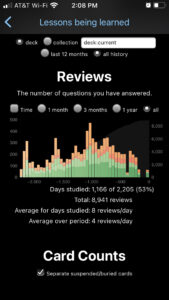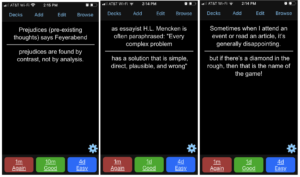A friend asked me recently what some of the core principles are in my note taking and review system. I get a whole lot of value out of my note system and I love talking to notes nerds. But not notes for notes’ sake! For making an impact on the world, for the better.
When I read Dan Pink’s book A Whole New Mind and learned about what he calls Symphonic Thinking, or the ability to find connections between seemingly disparate entities, as a key thinking pattern for the future of work, I thought “wow, that’s what I’ve been doing already! I’m going to do it more deliberately!” And so I regularly cite research, reading, things I’ve heard on podcasts and more in my day job and my work outside of work. It’s one of my superpowers, but I really believe it’s something far more people could help the world with. I recently changed my Twitter bio to read: “Sharing thoughts for growth-oriented people about how information can be synthesized to build power to make the world a better place.”
My notes come from a wide variety of sources, but most commonly from things I’ve stopped and typed up into Roam Research after I’ve heard them read aloud to me either by Pocket, which I feed with links from Twitter using an IFTT applet that sends the links in any tweets I favorite to pocket, as well as a few key RSS feeds. I also read a lot of PDFs by text to speech using hte Voice Aloud PDF to speech iOS app on my phone. I “read” with my ears and clean my kitchen a lot, or jog. I’ve also been experimenting lately with spending 5 minutes scanning through Feedly RSS reader to find things to toss into Pocket and listen to read aloud.
So I read a lot (I also miss a lot, it’s ok) and then I stop when I hear something really good and I write it down in Roam. (Or if I’m jogging, I associate each thing I want to remember with one of my limbs, then I go through them one at a time “left arm, left leg…” when I’m done running and I write them down.)
These are some of the things that came to mind when my friend asked about my note taking and review system.
- Make it easy to take notes when you can. The Roam unofficial mobile interface has been essential for me.
- Failure to cite your sources can be a real pain – finding an easy and repeatable way to cite where a note came from can make a big difference. I have notes from years ago where the insight is good but I didn’t record the source and it’s a real bummer.
- Make it easy to review your notes, Anki flashcards are super helpful. Anki tells me I’ve been adding the equivalent of one card per day to my “lessons being learned” deck since late 2015.
- Make it easy to recall half-remembered flashcards, Roam’s search or my personal wiki control-F have been really helpful. I search in Anki sometimes too. I regularly have a hazy memory of something but search can bring it up in the background while I’m on a call for work.
- Review as much as you can, as often as you can. It’s just like an athlete practicing. I try to spend 10 or 15 minutes on my flashcards each day. I wish I spent more time, I’d love to double that. Or more. That’s something I’m actively working on right now. You can see my scorecard there on the right. Lots of room for improvement, but that’s better than a poke in the eye. If I could consistently review 20 flashcards a day and really integrate the acquired wisdom with my life…that would be amazing.
- As I review the flashcards, I try to think about a real life scenario I could apply that concept to. That makes it far more real and stick in my mind.
- After each review session, there’s often one flashcard in particular that I really dig into. I might spend 5 minutes writing about it. I might just think about it while going about my day.
Those are some of the things I’ve been doing for the past few years. I’d love to hear anyone else’s tips and tricks you use as well. Ultimately, I think a lot of it is just about showing up. Being imperfect, coming back to the path, and applying what you’ve learned and reviewed in the real world.
Below, some examples of 3 of my most recently added flashcards. These ones Anki is going to show me again in a couple of days, but in time it will space them out over years. Good luck to you in your studies and their application!
